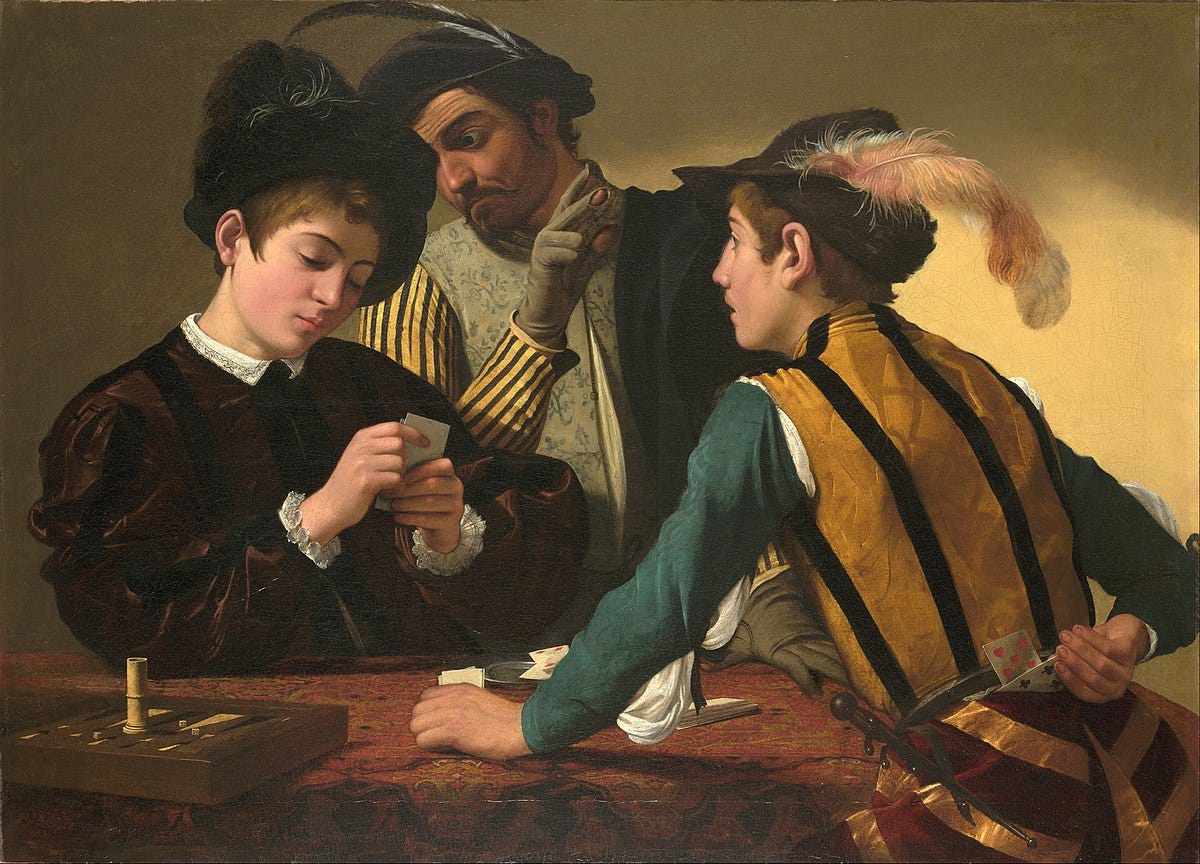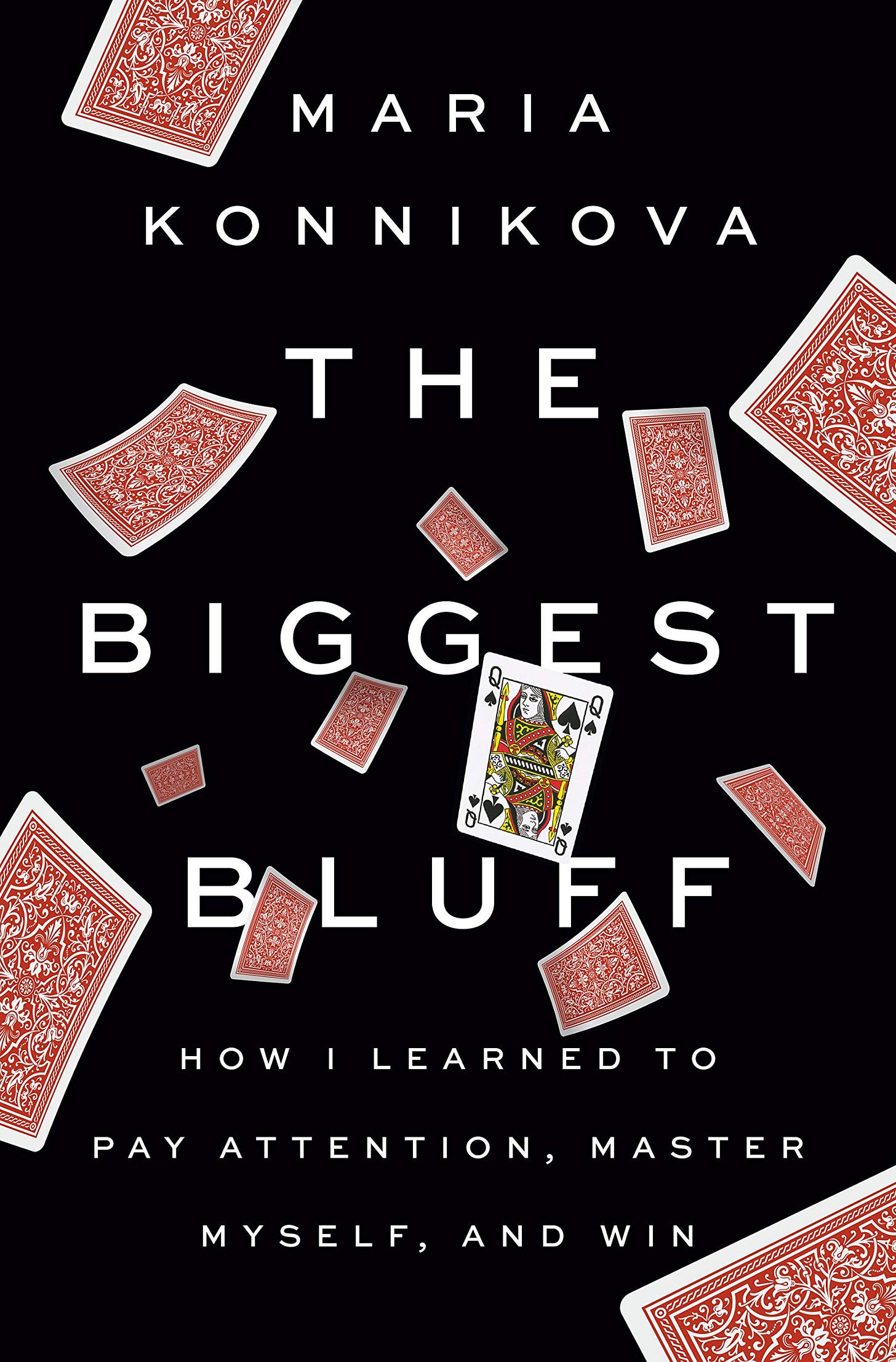What Poker Can Teach Us About Leadership and Emotional Intelligence
Going all in requires skill and luck; but it also requires massive self-awareness.

“But for its costliness and dangers, no better education for life among men could be devised than the gambling table—especially the poker table.” — Clemens France, 1902
I can’t remember when I first became aware of Maria Konnikova.
Most likely, it’s from her then-regular “Literally Psyched” column in Scientific American in the early 2010s, where she wrote a number of entries on lessons from Sherlock Holmes. Her undergraduate degree in psychology and creative writing, followed by her Ph.D. in psychology provided the ideal preparation for this work.
More vividly, I remember meeting Maria at the annual dinner of the Baker Street Irregulars, the Sherlock Holmes literary society, of which I am a member. She was an invited guest and seemed a little unsure of herself in the crowd of lawyers, doctors, authors, business people, teachers, exterminators, Hollywood directors, booksellers, and various other individuals who represented a microcosm of society.
But her curiosity and affability quickly dispelled any notion of insecurity, as she joined in the welcoming and witty repartee that is the hallmark of the BSI. She was a quick study, reading the large room in record time amid cocktails, hors d'oeuvres, and loud chatter, before settling into a comfortable gaggle that included Pulitzter Prize-winning Washington Post columnist Michael Dirda, author, screenwriter, and director Nicholas Meyer, and publisher, editor, and bookseller Otto Penzler.
That ability—to remain silent and make keen observations before jumping in—is an indicator of good leadership. It’s all too tempting to want to hold court on a topic (especially one which you know so much about) or to give a rambling soliloquy to qualify yourself to a new crowd.
A good leader knows when to remain silent.
“Silence is one of the great arts of conversation.” — Cicero
The real test for Maria would lay ahead. This well-published, well-educated author and speaker took a leave of her job at The New Yorker and decided to become a professional poker player. But not as a dilettante; her goal was to become a poker champion within a year.
While there were many questions that Maria would have over the course of the following few years, she learned quite a bit by quietly observing. And we're the beneficiaries of her diligence.
Konnikova’s latest book is The Biggest Bluff: How I Learned to Pay Attention, Master Myself, and Win, and although the subject is nominally different than her previous books (Mastermind: How to Think Like Sherlock Holmes and The Confidence Game: Why We Fall For It Every Time), follows a theme: that the human mind is simultaneously complex and predictable, and there are patterns and cues available for our consumption.
The attributes of Maria that I mentioned above—affability and curiosity—are central to The Biggest Bluff. They’re what allow her to befriend Erik Siedel, one of the top professional poker players in the world. And to absorb the game, its quirks, and its specialized vocabulary.
But more than that, she grapples with the idea of luck, superstition, and seeing poker for what it is: a very human game of chance. A game that, unlike chess or Go, is driven by rationality rather than by algorithms.
“It is so difficult not to become vain about one’s own good luck.” — Simone De Beauvoir, 1963
Many of us—particularly those of us who have risen through executive ranks—consider our success a matter of our contributions, as if we are in control of our lives and our status is a result of our talent and accomplishments. It's a comforting thought; input yields an expected output. Sounds rational, right?
At the end of the book (spoiler alert!), Konnikova reveals “the biggest bluff of them all: That skill can ever be enough.”
In fact, we have less control than we think. Swirling around each of us are innumerable variables, each independent of the other, and intersecting with our lives when we least expect it. These variables contribute to our failures and our successes, but we're not in a position to control them.
Call them luck, call them fortune, call them chance or superstition, it’s all the same: circumstances that we can’t control. But if we put ourselves in the proper mindset, we can tilt ourselves one way or another, as a sail catches wind.
Emotional intelligence and poker intelligence
Throughout the book, Konnikova introduces us to a cast of characters from both the worlds of poker and psychology. The nuggets of wisdom, lessons, and observations she picks up along the way resonated with me, in a way that applied to leadership.
Particularly with respect to some elements of emotional intelligence, or EQ. According to A Dictionary of Psychology (3rd edition), emotional intelligence is:
“the ability to recognize one's own and other people's emotions, to discriminate between different feelings and label them appropriately, and to use emotional information to guide thinking and behavior.”
I can’t think of a better description of the skills necessary to succeed at poker.
Some of the aspects of emotional intelligence that stood out to me as relevant to poker include:
Self-management (keeping those emotions in check, not getting irrational)
Social awareness (being observant of your surroundings and competition)
Relationship management (the spoken and unspoken exchanges between you and other players)
Self-awareness (the ability to reflect and make an honest assessment of your performance)
That last one is the most important aspect in leadership and poker. Being honest with yourself means making hard decisions about when to end a venture. As the Kenny Rogers song goes, “You gotta know when to hold 'em, know when to fold ‘em…”
Leadership isn't about mastering skills, or even mastering others. To be a good leader, first you need to master yourself.
Or, as Konnikova writes:
“One of the most important lessons of poker strategy, intimately connected to self-assessment, is this: sometimes, it’s the hands you don’t play that win you the title. We remember the hero calls. What about the hero folds? What you don’t do rather than what you do—that can be greatness. The art of letting go can be the truly strong one. Acknowledging when you’re behind rather than continuing to put good money after bad. Acknowledging when the landscape has shifted and you need to make a shift yourself as a result.”
Just as I wrote last week (in “Honor and Duty”) regarding how we can see results from actions not taken as well as from actions taken.
Leadership strategy and poker strategy
In addition to principles of emotional intelligence, other strategic leadership activities stuck out to me. Here are a few.
Position is king.
If you’re last to bet, you have the benefit of all of the other moves before yours. You have the power. If you wait to listen to everyone in the room or for other competitors to make a first move, you have the advantage of more information.
Mindful vs. mindless activity.
There are always possibilities and choices. Making a decision based on informed choices is mindful; making decisions on a whim or because you feel you have to is mindless.
Your strategy should be flexible.
Values and vision are set, but strategies change. Strategies consist of a system or a process that is informed by experience and need to be updated with real-time feedback.
Area of expertise matters.
It pays to specialize sometimes. An analogy comes from the most effective hunter in the animal world. It’s not the cheetah, lion or wolf; it’s the dragonfly. Why? Because the dragonfly has evolved a sense of vision where it can detect the slightest variation in movement by its prey. It gives the dragonfly a 95% effective kill rate. If you spend time developing a skill in a particular area, it can make the difference between victory and defeat.
Experience is required.
You don’t rise to the top by just showing up and relying on luck and intuition. You need to put in the hours. To practice—sometimes for what feels like an eternity—before you're ready.
Pick your spots.
Know when to be aggressive and how to be aggressive. Always-on aggression isn’t effective—particularly if your opponent expects it.
Focus on the process, not the results.
Don’t get hung up on failures, successes, or luck. The way we frame something affects our mindset and emotions, which in turn affects the decisions we make. By saying or thinking that things happen to us, we avoid taking responsibility for our actions. “These are the seeds of resilience, of being able to overcome the bad beats that you can’t avoid and mentally position yourself to be prepared for the next time.”
You need to pay attention.
Many things are happening around us, and we’re tempted to chalk a few up to luck or market conditions. We can’t control any of those things. What can we control? Our own behavior. Our reaction to things, as the Stoics teach us. “We can’t control the variance. We can’t control what happens. But we can control our attention and how we choose to deploy it.”
Don't forget the why.
It’s important to construct a narrative about your opponents (“In the game of poker, you’re a detective and a storyteller,” a mentor told Konnikova) while creating your own story at the same time. What's the story and why is someone doing it? Why are they making a move? Always ask yourself why someone is behaving a certain way.
The object of leadership
Mike Caro, a professional poker player and author, asks his audiences, “What is the object of poker?” He may just as well ask “What is the object of life?” as poker, particularly in Konnikova's powerful storytelling style, is analogous to life. It's also analogous to leadership.
After many members of his audience make guesses related to money, Caro lays the truth on them: “The object of poker is making good decisions.”
Anyone can make decisions; indeed, it’s what we expect from leaders. Faced with choices—buy or sell, hire or fire, action or inaction—leaders make choices based on information at hand. More than the outcome, it’s the process that matters. Leaders need to know—and in many cases need to justify—the reasoning behind their decisions.
“In every tablet there are as many grains of luck as of any other drug. Even intelligence is rather an accident of Nature, and to say that an intelligent man deserves his rewards in life is to say that he is entitled to be lucky.” — E.B. White, 1943
It’s sheer joy to follow Maria's journey, to be invited into her inner thoughts and insights that she shares en route, and to drink in the references from literature, philosophy, and psychology that she liberally and effortlessly incorporates.
The wonderful surprise is that even though she realizes that fortune is a fickle thing, gossamer-like in nature, she still manages to bend it ever so slightly (for that’s all that's required in poker) to her advantage.
All it requires is patience, fortitude, the ability to observe our environment and ask why, and the willingness to do the hard work and spend time reflecting.
For it’s reflection that gives us the ability to hit pause or reset. And it’s reflection that allows us to achieve self-awareness.
For that is where our potential lies.






